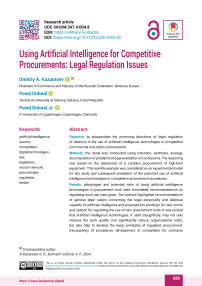Using Artificial Intelligence for Competitive Procurements: Legal Regulation Issues
Автор: Kazantsev D. A., Dohnal P., Dohnal Jr. P.
Журнал: Journal of Digital Technologies and Law @lawjournal-digital
Рубрика: Государство и право. Юридические науки
Статья в выпуске: 2 (3), 2024 года.
Бесплатный доступ
Objective: to substantiate the promising directions of legal regulation of relations in the use of artificial intelligence technologies in competitive (commercial and public) procurement. Methods: the study was conducted using induction, synthesis, analogy, decomposition of problems and generalization of conclusions. The reasoning was based on the experience of a complex procurement of high-tech equipment. This real-life example was considered as an experimental model for the study and subsequent prediction of the potential use of artificial intelligence technologies in competitive procurement procedures. Results: advantages and potential risks of using artificial intelligence technologies in procurement work were formulated; recommendations on regulating such use were given. The authors highlighted recommendations of general legal nature concerning the legal personality and delictual capacity of artificial intelligence and proposed the wordings for new norms and options for regulating the use of new procurement tools. It was proved that artificial intelligence technologies, if used thoughtfully, may not only improve the work quality and significantly reduce organizational costs, but also help to develop the basic principles of regulated procurement: transparency of procedures, development of competition for contracts between qualified suppliers, reasonableness of decisions, and economic efficiency of the customer’s expenditures. Scientific novelty: despite a large number of works devoted to both the problems of artificial intelligence in general and its use in procurement in particular, the article considers this topic on the basis of mainly inductive reasoning, built on handling a particular case and experience of complex procurement for knowledge-intensive research, refracted through the prism of essential correlation between the basic concepts of “digitalization”, “automation”, “robotization” and so on. Practical significance: the directions of using artificial intelligence described in this paper can be implemented by corporate and, in the future, by public customers to improve the quality of their procurement. At the same time, the recommendations on the normative regulation of such innovation seem to be in demand both at the legislative and local levels.
Artificial intelligence, auction, competition, digital technologies, law, legislation, neuron network, procurement, regulation, tender
Короткий адрес: https://sciup.org/14130869
IDR: 14130869 | УДК: 34:004:347.4:004.8 | DOI: 10.21202/jdtl.2024.30


